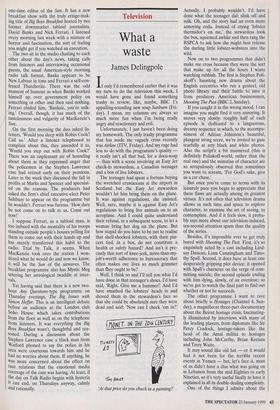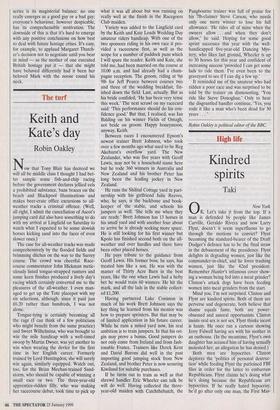Television
What a waste
James Delingpole
If only I'd remembered earlier that it was my turn to do the television this week, I would have gone and found something trashy to review, like, maybe, BBC l's appalling-sounding new soap Sunburn (Fri- day). I mean, my columns are always so much more fun when I'm being really angry and reactionary.and evil.
Unfortunately, I just haven't been doing my homework. The only trashy programme that has made me vaguely cross recently was Airline (ITV, Friday). And my rage had less to do with the programme's quality it really isn't all that bad, for a docu-soap — than with a scene involving an Easy Jet check-in stewardess, a Canadian teenager and a box of live lobsters.
The teenager had spent a fortune buying the wretched crustaceans at the airport in Scotland but the Easy Jet stewardess wouldn't let him bring them on the plane. It was against regulations, she insisted. Well, sure, maybe it is against Easy Jet's regulations to bring live animals on to an aeroplane. And I could quite understand their refusal, in a subsequent scene, to let a woman bring her dog on the plane. But how stupid do you have to be not to realise that shell-shocked lobsters, with their pin- cers tied, in a box, do not constitute a health or safety hazard? And isn't it pre- cisely that sort of knee-jerk, more-than-my- job's-worth adherence to bureaucracy that often makes our lives so much grimmer than they ought to be?
Well, I think so and I'll tell you what I'd have done in that teenager's shoes. I'd have said, 'Right. Give me a hammer!' And I'd have smashed the lobsters' heads in and shoved them in the stewardess's face so that she could be absolutely sure they were dead and said: 'Now can I check 'em in?'
At that price do you chuck in a painting?' Actually, I probably wouldn't. I'd have done what the teenager did: slink off and sulk. Oh, and the story had an even more annoying coda. Instead of crying 'lobster thermidor's on me,' the stewardess took the box, squirmed awhile and then rang the RSPCA to ask how she might best release the darling little lobster-wobsters into the wild.
Now on to two programmes that didn't make me cross because they were the sort that make up for all the hours I waste watching rubbish. The first is Stephen Poli- akoff's haunting new drama about the English eccentrics who run a genteel, old photo library and their battle to save it from predatory American businessmen, Shooting The Past (BBC 2, Sunday).
If you caught it in the wrong mood, I can imagine you might find it very annoying. It moves very slowly: roughly half of each episode is dedicated to a languorous, dreamy sequence in which, to the accompa- niment of Adrian Johnston's beautiful, plangent string score, we're invited to gaze tearfully at arty black and white photos. Also the script's a bit mannered (this is definitely Poliakoff-world, rather than the real one) and the minutiae of character are so scrupulously observed that sometimes you want to scream, 'For God's sake, give us a car chase.'
But once you've come to terms with its leisurely pace you begin to appreciate that these flaws are actually among its greatest virtues. It's not often that television drama allows us such time and space to explore character, to examine the art of seeing, to contemplate. And if it feels slow, it proba- bly says more about our television-induced, ten-second attention spans than the quality of the series.
Besides, it's impossible ever to get truly bored with Shooting The Past. First, it's so exquisitely acted by a cast including Lind- say Duncan, Liam Cunningham and Timo- thy Spall. Second, it does have at least one desperately gripping plot device: it opened with Spall's character on the verge of com- mitting suicide; the second episode ending with him dying, slowly, of an overdose; so we've got to watch the final part to find out whether or not he succeeds.
The other programme I want to rave about briefly is Hostages (Channel 4, Sun- day), a magnificent three-part documentary about the Beirut hostage crisis, fascinating- ly illuminated by interviews with many of the leading players, from diplomats like Sir Percy Cradock, hostage-takers like the head of the Amal militia to hostages including John McCarthy, Brian Keenan and Terry Waite.
It may sound like old hat — or it would had it not been for the terrible recent events in Yemen — but, let's face it, most of us didn't have a clue what was going on in Lebanon from the mid Eighties to early Nineties, so it's very useful finally to have it explained in all its double-dealing complexity.
One of the things I admire about the series is its magisterial balance: no one really emerges as a good guy or a bad guy; everyone's behaviour, however despicable, has its comprehensible motivation. The downside of this is that it's hard to emerge with any positive conclusions on how best to deal with future hostage crises. It's easy, for example, to applaud Margaret Thatch- er's decision not to negotiate until you bear in mind — as the mother of one executed British hostage put it — that she might have behaved differently had it been her beloved Mark with the noose round his neck.



























































 Previous page
Previous page